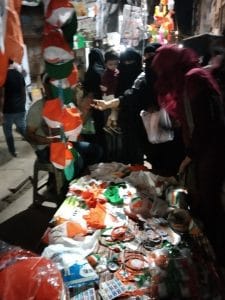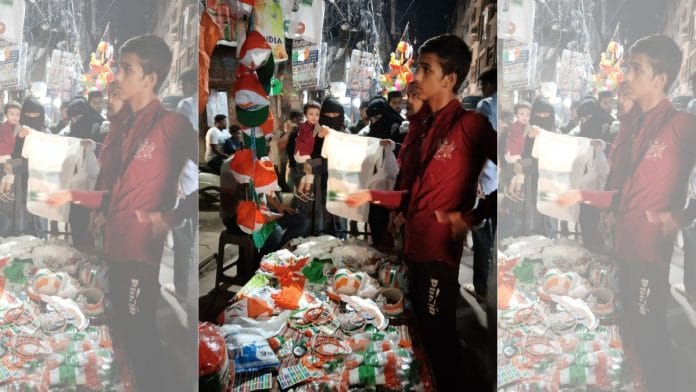How do Muslims celebrate Independence Day?” This absurd question irritates me. As a Dilliwala, I know how 15th August celebrations begin in Jama Masjid area each year. The bangle sellers, or Churiwale, display tricolour bangles at their stalls to attract girls, especially young married women. The kite shops are packed with different kites and manjhas. Almost all Muslim households put a Tiranga on their rooftop—even without the ‘Har Ghar Tiranga’ call. Families invite their children, especially the married daughters, and relatives at home to have a mandatory annual feast. Young men participate in kite competitions in the morning, and the evening is marked by atishbazi, or fireworks. This is what I have observed and experienced in my own family.

My everyday experience, however, should not be exaggerated to paint a sweet, rosy picture of Muslim patriotism. The question “how do Muslims celebrate Independence Day?” is not as innocent as we think. It is serious political anxiety, which is inextricably linked to the idea of national Independence and the expected role of Muslims in it.
National Independence, at least in a political sense, is not a fixed phenomenon. It is always defined in relation to changing political realities and electoral requirements. For this reason, Muslims’ association with official commemorative practices must be explored as an everchanging discourse of expectations. In other words, we must look at the ways in which different generations of Muslims are asked to prove their loyalty; and how these ‘loyalty tests’ contribute to the dominant notions of national independence. Three watershed moments are significant in this regard.
Also Read: Satanic Verses to Kaali—religion-arts binary isn’t real. Hurt sentiments staged in 3 ways
Threat of disintegration and Muslims
Jawaharlal Nehru offered a very interesting conceptualisation of India’s Independence, especially in the early 1950s. He was keen to define India as a ‘Leviathan State’—a State that represents a social contract among different communities to protect their distinct collective interests.
In this schema, British rule was seen as a ‘state of nature,’ in which every community was fighting for its own parochial interests. The Indian State, being the outcome of a national consensus, was committed to protecting Indian communities from the danger of this parochialism. In other words, an informal doctrine of unity in diversity was established—if Indian communities fail to protect the State, their individual existence would cease to exist.
Muslims had an interesting placing in this framework. They were asked to remain committed to the Nehruvian project of nation-building. An interesting binary between good nationalist Muslims and the bad anti-national Muslims was established to justify a set of expectations. Unlike other communities, Muslims had to participate in national life, especially in national celebrations in a way that their Muslim identity could easily be noticed.

Also Read: Hindutva opponents must go beyond Muslims as invaders vs legal citizens categories
Threat of external aggression and Muslims
A new meaning was attributed to the idea of national Independence in the post-1965 war period. Unlike Nehru, Indira Gandhi relied heavily on ‘external threat’ from neighbouring countries to legitimise the vulnerability of the Indian State. The Independence, therefore, was to be protected not merely to uphold the values of social contract in a strictly abstract Nehruvian sense but also to secure Indian territories from ‘external aggression.’
This renewed imagination of the ever-vulnerable and threatened State became a source of
inspiration for Indira Gandhi. She used it even to silence her opponents in the post-Bangladesh period and eventually imposed National Emergency between 1975-1977 to protect India from “external aggression” and “internal disturbance”. The famous song, Dulhan Chali, Behan Chali from the 1970 Manoj Kumar starrer Purab Aur Paschim, perhaps best captures this imagination. It defines India’s Independence as a bride/sister in overtly Hindu terms to remind Indian communities that they should adhere to their official national identity.
A different and more profound set of expectations was posed for Muslims in this period. They were, as usual, asked to prove their anti-Pakistan stand. At the same time, it was expected from them to wholeheartedly accept all political decisions taken by the Congress regime without any protest or criticism.
Nazima Parveen’s recent book, Contested Homelands, shows that whenever Muslim communities refused to abide by official orders in the 1970s, they were systematically targeted and punished by the Indira Gandhi government, especially during the Emergency period.
Also Read: Namaz isn’t an anti-Hindu act. Time for every Indian to defend Islam
Threat of terrorism and Muslims
The assassination of Indira Gandhi in 1984 and militancy in Kashmir and the Northeast gave a new twist to the idea of Independence. It was understood in relation to what is now known as national security. A more concrete and workable definition was produced by the Ministry of Home Affairs (MHA) in later years. It now identifies four types of internal security issues: Terrorism in the hinterland, Left-wing extremism in certain areas, insurgency in the Northeastern states and cross- border terrorism in Jammu and Kashmir.
This new imagination of Independence has produced what I call ‘Muslim politicophobia.’ The global anti-Islamism and anti-Muslim communalism led to a new political consensus in the early 2000s, especially in the aftermath of the 9/11 events. Political parties adopted this refined mode to address Indian Muslims not merely as a problematic religious minority but also as part of a global Islamic umma.
The scope of this ‘loyalty test’ has also been expanded accordingly. Muslim communities now have to demonstrate that they are committed to the unity and integrity of the nation. They also have to overwhelmingly show their anti-Pakistan attitude. Finally, and perhaps most importantly, they have to assert that the Islam(s) they practice is different from the Jihadi Islam propagated by terrorist organisations like al-Qaeda.
It is important to remember that this discourse of expectations does not affect any other religious community except Muslims. There is no pressure on a Hindu to come forward and say that they are committed to national integration and do not support the version of Hinduism that is used to justify the lynching of innocent Muslims.
That may be the reason why no one is going to ask, “How do Hindus celebrate Independence Day?”
Hilal Ahmed is a scholar of political Islam and associate professor at the Centre for the Study of Developing Societies (CSDS), New Delhi. He tweets @Ahmed1Hilal. Views are personal.
(Edited by Zoya Bhatti)






